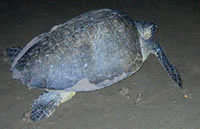March 20th, 2006 – Article in The Hindu on the plight of the Olive Ridley turtles
- Home /
- March 20th, 2006 – Article in The Hindu on the plight of the Olive Ridley turtles
The sea turtle laid her eggs just beside the submarine which VSPCA has been trying to get removed from the Visakha beach for many years. It was 8 o’clock at night and in full glow of the harmful night lights. Based on the Hindu article below there was inquiry from Hyderabad Forest Headquarters which lead to an inspection and they will hopefully begin to understand that they must do something for the poor turtles. We are also having a meeting with a local lawyer to improve all environmental issues and plan how to move ahead from a legal view point.
— Pradeep Nath

Photo by Asha Philar, VSPCA volunteer: Olive Ridley sea turtle returning to the Bay of Bengal after laying her eggs.
Mechanised trawlers prove bane of Olive Ridley turtles
Most trawlers do not use the turtle excluder device
by Nivedita Ganguly, The Hindu (article link)
VISAKHAPATNAM: Considered to be on the verge of extinction, Olive Ridley turtles have attracted a great deal of attention from conservationists. However, the war between the turtles and trawlers has resulted in the death of a large number of these turtles. Just a few days ago, three dead turtles were reportedly spotted by the Greater Visakha Municipal Corporation (GVMC) workers at the Ramakrishna Beach. “Initially, we were afraid of touching them. Later, we buried them in the sand,” said Ratna, a worker.
Unscrupulous fishing by mechanised trawlers along the State’s coast during the turtle season was a major cause for failure of mass nesting, observed Pradeep Kumar Nath, President of Visakha Society for Protection and Care of Animals (VSPCA). Most trawlers don’t use the Turtle Excluder Device that has an opening on the nets for the trapped turtles to get back into the sea. Fishermen complain that some portion of their catch is lost in the process. “But that’s not true. We have observed that the loss is hardly two per cent,” added Nath.
During the months from January to May, the turtles arrive in large congregations for sporadic nesting in this part of the world. Last Monday, the beach road visitors were witness to a rare sight when two Olive Ridley turtles were found on the beach laying eggs. But the ignorant onlookers ended up disturbing the marine visitors. Oblivious to the fact that the turtles were laying eggs, some people suggested that the turtles be put back into the sea as “they might have lost their way.”
“The awareness level among the local people is low. But the forces of nature are stronger than the danger signals, which the Ridleys might be receiving. So they are forced to move to the shore for nesting before resuming their journey towards the Orissa coast,” explained Nath. Volunteers of VSPCA earmark the areas on the beach and protect them from dogs. An adult turtle on an average lays 60 to 70 eggs, from which hatchlings emerge after 45 to 50 days, he says.
After a few months, the eggs hatch and the hatchlings find their way back to the sea. “As the babies are sensitive to bright light, they tend to move inland rather than towards the sea,” he added.
For frequent updates and links to many of the above stories please check our Facebook and Twitter feed.
